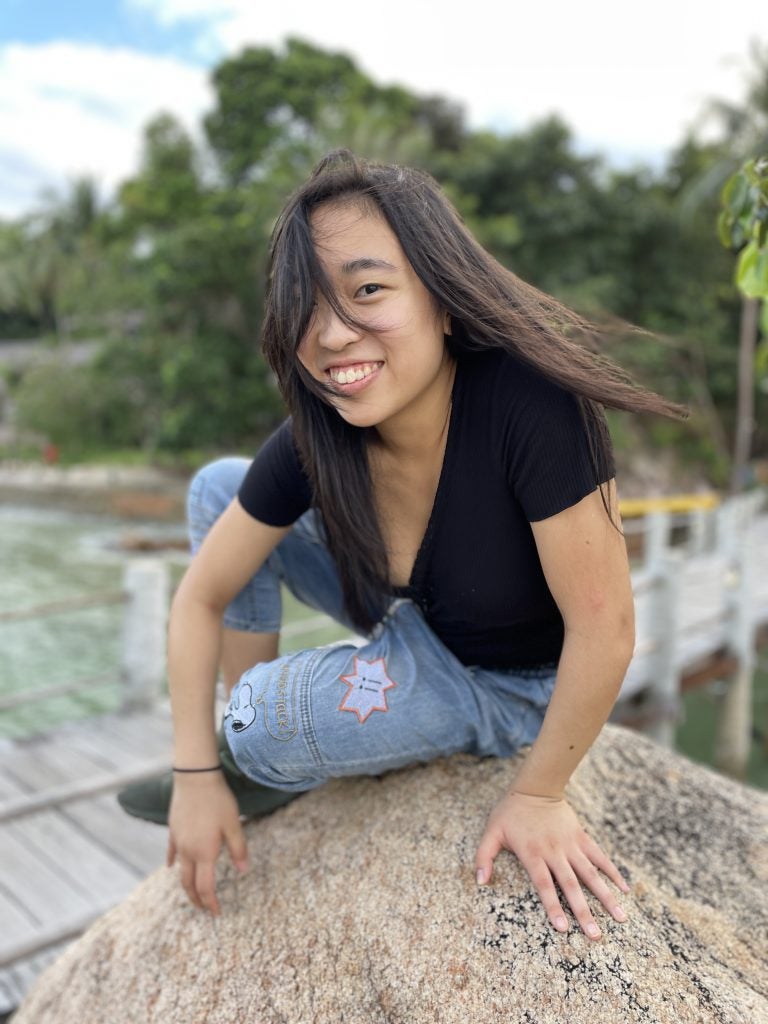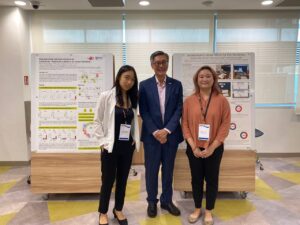In Pursuit of Holistic Research Learning: NUS Exchange Student and REx Fellow shares her experience with Research Experience Programme
Dealing with data using storytelling, analysing ethical scenarios in research projects and understanding the various approaches to communication in research are some of the interesting workshops that REx students have been exploring since the start of Semester 2 in AY2022/24. The Research Experience (REx) programme, a new course upgrade to the Undergraduate Research Opportunities Programme (UROP) course, seeks to develop a community of practice, whereby students, educators, faculties and research institutions share a strong interest for undergraduate research and ways to enhance undergraduate research experiences by working together and learning from one another.

Clarissa Aphrodite Talitha Sastrawidjaya, first REx graduate from Semester 2 AY2022/23 with Mr. Ambert Ang (Dept. of Biological Sciences) and friends from the NUS Amgen Scholar cohort (first row, second from left)
This includes providing the means for students to interact with their project from actual practice settings, including enterprise programmes and internship programmes. Launched in 2023 by the UG Research coordinating team from the Office of the Provost, this course upgrade seeks to encourage undergraduate students to expand their research learning beyond the classroom. The REx programme includes a grant of up to SGD2500 for their research project, overseas research trip opportunities, and a certificate of recognition. In our very first REx article, REx programme’s inaugural graduate, Clarissa Aphrodite Talitha Sastrawidjaya shares her experience in REx:
1. What got you interested in research?
I became increasingly dissatisfied with rote classroom learning and started to question whether I really knew the things I had learnt. I thought engaging in research would be the best way to put my skills to the test. In addition, being able to exert creativity is something I consider to be central to my identity. Risk-taking and creativity play vital roles in research, although their importance is often understated in traditional science education. I suspected that research could be a way for me to satisfy my urge to be creative.
2. Why did you to opt to do UROPS+REx?
Part of the reason why I chose NUS for exchange was because I was looking for intensive research training—something which I struggled to find at my home university. You can imagine my delight to learn that NUS offers UROPS. This was a novelty to me because my degree does not offer purely research-based modules during normal term time (apart from the one-semester thesis project). I was more delighted still to be contacted for participation in the REx programme. This was exactly the kind of enrichment I was hoping to find at NUS. I believe these kinds of opportunities are essential for undergrads to partake in, so as to cultivate a more holistic view of not just one’s field of study, but of the nature of scientific inquiry itself.
“I came to Singapore on exchange seeking to fully immerse myself in biomedical research. In the end, I found all of that and more. A key reason why was because of REx. I was given opportunities and experiences which went beyond my imagination. The interdisciplinary nature of the REx programme, bringing scholars from all backgrounds together, also meant that I was free to explore novel ways of presenting my research unconfined by the natural sciences. The whole point is to make research findings accessible to everyone. Ultimately, REx is what you choose to make it: the programme’s freedom and fine-tunability is its greatest strength.
Although it can be challenging, I believe that conducting research is one of the most fulfilling paths a person can pursue. Programmes like REx are necessary and lead the way in preparing students to conduct some of the most valuable contributions one can make to humankind.”
-Clarissa, REx programme AY2022/23
3. How did REx help you understand what it takes to do research?
This may seem obvious, but the REx programme helped me understand what it takes to do research by exposing me to so many researchers. I felt free and safe to ask all the questions I had. I learnt the most from these interactions, if not one-on-one then in small groups. Supported by the REx grant, I also had the opportunity to attend my very first overseas conference in Taiwan. There, I watched so many admirable researchers from around the world present their work, which underscored to me the necessity for collaboration and human connection when conducting science. At the end of the day, research is a team effort, and it’s important to reach out.
4. What would you like to suggest to students keen on doing research?
In research, you are constantly in a state of not knowing. This can be a lot of fun—having the freedom to formulate all the questions yourself, as well as how to answer them—or, it can be incredibly isolating. Research programmes generally don’t encapsulate this feeling. At the same time, these programmes are necessary to do in order to gain confidence and exposure to lab environments. My advice would be to take control of your own learning. And if you find that the ethos of one lab doesn’t suit you, try another one. Most likely, you will encounter a lot of failure along the way. But don’t give up! Remember that these failures are necessary for improvement. Ultimately, success in research (however you choose to measure it) is an open-ended question and it’s up to you to figure out how to answer it.
5. What are your future aspirations in your academic learning and career moving forward?
In all honesty, I am not yet confident in the things that I know, even in my own discipline. Sometimes I feel a sort of emptiness when realizing the vastness of what’s unknown to me. But I recognize that this feeling is natural. It should be used as an impetus to keep learning, keep practicing research. I hope that someday I’ll reach a point where I feel secure in my own knowledge and ability to conduct science. For now, I can only seek out all the opportunities I can to improve my skills. This doesn’t just mean more research programmes and internships; I would like to take either a master’s degree, or work in industry for some time, before finally moving on to graduate studies.

Clarissa with NUS President Tan Eng Chye and fellow REx Fellow Nicole Chan Jie Yu at the Medicine+ Science Library in August 2023. Clarissa’s work was recently displayed as a poster presentation for the Medicine+ Science Library Opening ceremony. Her research dealt with designing bioengineered red blood cell extracellular vesicles as a novel platform for cancer treatment.

- Home
- RExflect with Clarissa!

